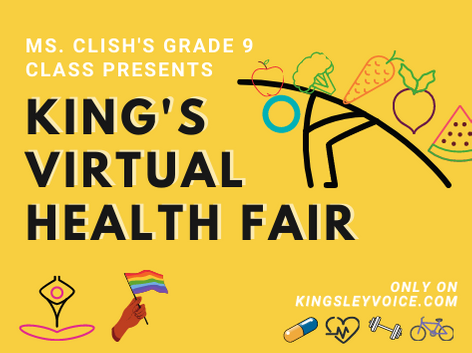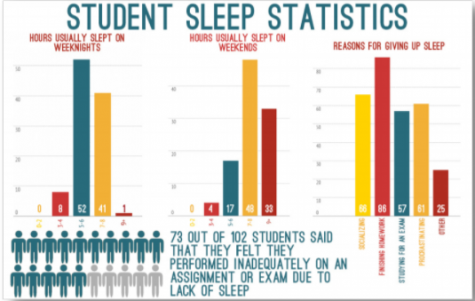
Sleep and Teenagers
April 28, 2021
During teen years, the body and brain continue to develop, and sleep is very important during this period, but many teens are not getting enough sleep. The national sleep foundation recommends teens get 8-10 hours of sleep each night so that teens maintain their physical health, school performance, and emotional wellbeing, but on average most teens are getting 7 hours of sleep. Here are the physical effects of sleep, how lack of sleep affects school, how screen time affects sleep and the negative effects of caffeine.
Screen Time and social media have been continuing to reduce teenager’s sleep quality and increase the risk of sleep-related issues. According to research conducted by the Sleep Foundation in February of 2021, 95% of adolescents retain access to smartphones, and about 45% report being online almost constantly. In total, the average teenager gets up to nine hours of screen time every single day.
This research found the greater amount of time teenagers spend on screen-based activities (like social media, web surfing, watching TV, and gaming), the more trouble in which they had trying to fall asleep, and the less sleep they were able to get during the night. These sleep-related issues were then linked with increased symptoms of common sleep disorders such as insomnia which can cause adolescents to wake up too early, or make it difficult for them to fall asleep or stay asleep.
There is an increased concern about how the effects of blue light can disrupt the sleep-wake cycle. Blue light is a type of light that initiates alertness. Blue light given off of the screen delays melatonin release, which is a hormone the brain produces at night that lets the human body know that it is time to sleep.
Blue light results in screen time pushing back bedtimes and leading to a restless sleep overall, as it is tricking a teenager’s body into thinking that it is daytime. As the majority of teenagers have early school start times, a later sleep time generally brings about less rest and expands following day fatigue.
Many teens across the world are getting less than 8-10 hours of sleep, which affects how they think, feel, and function. When teens get less than the recommended amount of sleep it affects their performance in school. A U.S study found that teens who got 8 hours of sleep got A’s, and those who got 7 hours of sleep got C‘s.
Lack of sleep affects how teens think, and this is a big problem when they are in school. When teens can’t think they will forget school supplies at home, due dates, and important information. If teens can’t remember information they will end up failing their tests, and if they forget due dates they will lose marks for not completing their homework on time.

Moods are also affected by lack of sleep, which leads to frustration and anger. If a teen can’t figure out how to do their homework they will get frustrated and not end up doing it. They could also have random outbursts or cause trouble at school due to them being moody, which will cause them to go to the principal’s office.
Without enough sleep teens’ focus is also affected, and they easily get distracted. With their focus being affected they cannot concentrate which causes them to not know what their teachers are saying and not understand schoolwork. They might not even realize the little mistakes they make in their schoolwork.
Teenagers’ memory is also negatively affected when they don’t get enough sleep. It makes it harder for them to remember new things, which is bad because they won’t be able to remember new information which they will use in the future on tests. When they are answering questions they won’t be able to remember the information they read, causing them to get the questions wrong.
Caffeine causes sleep deprivation, sleep deprivation causes drowsiness which can cause the teen to consume more caffeine during the day which contributes to the unhealthy cycle. Some symptoms of caffeine withdrawal can be drowsiness, headaches, anxiety, difficulty focusing, a depressed mood, irritability, tremors, low energy… and many more.
Caffeine increases your body’s adrenaline, raises your heartbeat, raises your breathing rate, and increases vigilance and alertness. Caffeine also blocks adenosine receptors. Adenosine is a chemical your body makes which helps to bring down drowsiness.
In Canada coffee accounts for 53% of caffeine intake in teens from ages 13-18. The average daily dose of caffeine in teens is 300mg, roughly 3 ½ cups of coffee. A U.S. study of 5 to 12 year-olds published last December found that 75% of kids consumed caffeine daily. But it’s not only from soft drinks. More and more kids are drinking coffee and lattes regularly.
These same studies have shown that daily consumption of caffeine in females can lead to depression, anxiety, bulimia, anorexia, and various other mental health concerns. In a study done in 1970, only 11% of teens drank 2 cups of coffee in the morning, that same study was done in 2019 found out that 33% of teens drank 2 cups of coffee in the morning. Some sleep experts say “if you go to bed around 10 pm you should stop drinking products with caffeine in them after 4 pm”.
Everyone knows that sleep is important, it’s an often repeated fact that I’m sure you hear all the time. But a lot of people don’t actually know exactly how important, and what happens while you’re unconscious.
Resting does more than just give you energy, and a lack of sleep can cause serious health problems down the road such as high blood pressure, diabetes, heart attacks, and strokes. It can also stunt the physical growth of children and teenagers. Did you know a survey in 2007 reported that 69% of students weren’t getting enough sleep on the average school night?
Despite all this, sleep deprivation is quite easily avoidable. Keeping a consistent schedule for when you go to bed and wake up does wonders for the amount of rest your body actually gets.
Waking up early in the morning to do homework rather than staying up late is a good way to get around not having enough time to spend on school. In the morning you’ll feel more well-rested and may get your homework done faster as well.
If you do it enough you’ll actually start waking up at your normal time naturally, no alarm required! Your body will know what to do on its own so it can use the time you give it to get as much quality deep sleep as possible.
A lot of people put rest much too low on their list of priorities, often opting to use their time to do work or scroll through social media. It’s one of the main reasons sleep deprivation is such a big problem. Treating getting a good night’s sleep as something you have to do, like taking medicine or doing homework, rather than a privilege is a major first step towards a healthier life.
Speaking of a healthier life, not getting enough sleep can also undermine your other efforts. Things like eating better (especially with the intention of losing weight), exercising, and taking care of your mental health won’t work unless you have adequate sleep.
Proper rest is the key to an overall better life, a free and easy one that too few people take advantage of. So the next time you’re debating going to bed or spending just a few more minutes staying up, make the right choice.
While sleep is a vital component of life for people of all ages, for teenagers to develop emotionally, physically, mentally, and socially, they require sleep. Consistently getting good quality sleep balances hormones, improves the immune system, boosts metabolism, and improves brain function. These teenage years are a developmental period of life as the brain and body are experiencing a transition to adulthood and significant changes.
There are plenty of challenges teenagers may face to get consistent, restorative sleep. It is important to recognize these challenges to make a plan so that you can get the sleep you need. Throughout this article, you learned how screen time affects sleep, the negative effects of caffeine, how sleep affects school, and the physical effects of sleep on the body. To overcome the negative effects these aspects can bring with them, it is important to keep a regular sleep schedule. Even if real life stands in the way of achieving the perfect sleep routine, even making small changes can improve your quality of sleep drastically.
Getting enough sleep was challenging even before the global pandemic. Here are some useful and proven tips to improve your sleep:
Tips to avoid the negative impact screen time can have on your sleep:
- Switch your devices to night mode about 2 hours before bedtime. This will filter out the blue light on the screen
- Try to do a peaceful activity an hour before you sleep in place of the screen time you would normally have. Some activities you can do before bed that aren’t checking your phone are; reading a book, writing about your day in a journal, taking a warm bath or shower, and drinking some tea.
Tips to get enough sleep each night:
- Don’t take naps longer than 20 minutes
- Go to sleep at the same time each night, and wake up at the same time each morning
- Don’t eat a heavy meal close to your bedtime
- Eliminate all distractions
Tips on how to cut back from caffeine:
- Cut back slowly
- Reduce caffeinated beverages
- Stay hydrated
- Get enough sleep
- Boost energy naturally
